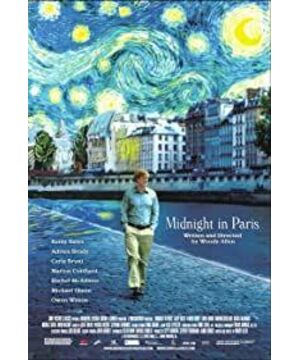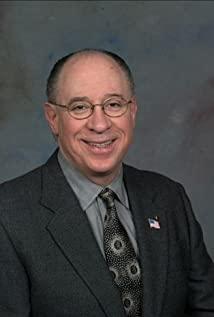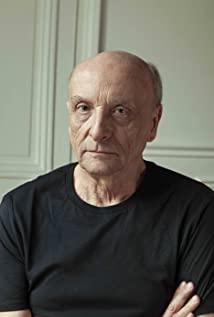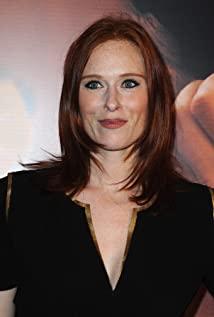When the tall lanky man introduced himself "Scott Fitzgerald" with his right hand outstretched, many people probably didn't realize that it was an ambush - a The ambush of the people who reproduced this fascinating reverie in the 1920s. Woody Allen is simply bringing people's day-to-day fantasies into reality, and the conflict between the latter and the current context destroys all surviving romance. When our Hemingway talks to people in his fiery prose and poetic language regardless of the occasion, and Dalí murmurs about his rhino like a neurotic, even hardcore literary enthusiasts like the protagonist Jill Pender will feel at a loss.
Many times, people need to use the reminiscences and memories of the past to fight the boring and ordinary reality, so they deliberately pick up those shining fragments from the past years to comfort their minds, and realize the alienation and transcendence of the world in fantasy. . Inappropriate, but rather its virtue. We presuppose the beauty of the past, so the more contradictory it is, the more it shows the superiority of the past; This fantasy is so seductive that in every age it is inevitable to fantasize about the last, simply because it promises you delirium happiness for no price. Anything that claims there is no cost, however, can only be a lie, because life, as Jill told Adriana, "is made of unhappiness." ("It's a little unsatisfying because life is a little unsatisfying")
To get rid of the lie, just let it come into the truth. Just like the dreamer will wake up when there is reality in the dream, just let Jill take a real look and see how out of place the literary and artistic tone he has been obsessed with will show in his life, those remnants and fantasies are natural The smoke disappeared. At this point, the irony of the clumsy and pious protagonist and the exaggerated behavior of the writers throughout the film is too obvious, and it even seems that Jill's metaphorical preaching to Adriana at the end is too much to repeat:
"I had a dream one night, it was supposed to be a nightmare - I ran out of 'Shishume' (antibiotics) and then I went to the dentist and he didn't have 'Novocaine' (anesthetics). You See what I'm trying to say? These people...these people don't have antibiotics."
You see, one day you will find that your antibiotics have run out, and you will have to face the reality of pain. So the ending of this movie is soberness and the retreat of fantasy. And the dreams of all the family members disappeared in the rain at midnight in Paris.
2
But isn't fantasy itself an important part of art? For literature, if there is no fantasy, how can there be a transcendence of reality? The movie once borrowed Mrs. Stein's words: "Don't act like a complete defeatist." It seems too frustrating.
And there is something worthy of scrutiny on this point. First, the film does not account for Paul Bates' results. If what the movie denies is fantasy, could this successful person who likes to drop his bookbag live in the moment be the object of praise and the winner? It's a bit hard to take... On the other hand, since Jill has been dreaming about Paris in the rain, why not let him do it on those dreamy nights? Why not let him tell us this as a satire of everything else by letting it rain during his poetic dialogue with Hemingway, while walking with Adrienne, and leaving them trapped, wet and embarrassed by the downpour The unrealistic and romantic non-existence of fantasy?
Why, on the contrary, did Jill give him a real Paris in the rain after he gave up his fantasy and returned to reality?
Yes, "true", that's what I meant to say.
Remember the words in "Manhattan"? "Intellectuals create a lot of nihilistic dilemmas for themselves and then let themselves get stuck in them—so they don't have to face the real dilemmas." As the saying goes, characters in Woody Allen's work Often such intellectuals. Whether it's Isaac, who is indecisive and indecisive in "Manhattan", or the two girls in "Love in Barcelona" who are obsessed with their own concept of love.
Look back at the people in Midnight in Paris. For Jill, is the affirmation of the people around it really that important? In his life, the biggest difficulty comes from his inability to beat reality with fantasy, and to make others believe as much as he does that the 1920s is the best era ever in human history? No, as long as you think about it for yourself, you will think of the biggest flaw in this part-time writer's life. In fact, it is because he has never been able to move to Paris as he expected and really start to engage in literary creation - this is true Difficult, isn't it? If he actually mustered up the courage to move to Paris, would he live with anxiety and failure every second as in the movie? In fact, the real negation is not for failure, but for hiding in a self-constructed conceptual world of "I love the 1920s, I have taste, and other people don't understand me". behavior; the real denial didn't come from his fiancée, Paul, or anyone else, but from his own heart that didn't dare to face life directly.
Paul faced a similar problem. He is not completely incompetent (being invited to give lectures by the Sorbonne University can prove his academic ability to a certain extent), but from the habit of dropping his book bag, he always hides his true face behind countless small knowledge that he pleases. Coming to Versailles, he said "whose work is that over there? Oh, I think it's Charles LeBlanc... Remember they can't take a shower because they only have a bathtub", he's never talking about objective reality , he just wanted to show his own existence.
This is a trait shared by many modern people, but it is more extreme in this character (you may have the impression that his comments on Monet's paintings mean nothing). We can even imagine such a character in real life: he is good at dancing and unwilling to be lonely, but he is afraid that he has no talent, so he never dares to study objective things fairly, and he can only hide himself in the knowledge world constructed by himself , using other people's ignorance of certain things to show his knowledge; he may be a university lecturer, an engineer, a professional manager... He may have a bit of ability, but in general, he is afraid of breaking away from one that is foolproof to him environment—a context entirely constructed and controlled by him. From this perspective, Paul's situation is worse than Jill, because the latter is just dodging after encountering difficulties, while the former has already avoided all difficulties and improvements. In this case, the disconnection between one's own heart and the image that one is trying to construct to the outside world is actually a kind of torture. Success is real, but the "he" who achieves success is not the real he; desires are real, but his identity by satisfying his desires is false. We might as well guess that after he had an affair with Jill's fiancee overnight, the discomfort that had been entrenched in his heart for many years would resurface-because he knew that the image that conquered Inez was the literary polymath he worked hard to build, not the truth. Only the self who dropped the book bag.
This is what these intellectuals look like in Paris at midnight. Jill wandered through the 1920s indulging in the false prosperity of the fantasy, while Paul continued to drop his bookbag and hide himself in the fortifications of nouns to express his self-comfort. Inez, by contrast, was much more real, at least she knew what she wanted: a successful worldly person with a certain taste that would give her a good life. So remember? She didn't want to hang out with Jill and insisted on going back to the hotel to sleep - nothingness should only exist in sleep.
Paris is contemporary Babylon, a place of great culture and great masters, and perhaps that's why Woody Allen chose Paris for this story, just as he chose Manhattan, the new center of the modern world. When midnight in Paris falls, the literati of the new century are also drunk in the dark night, indulging in the fences they have built.
In this film, only the rain is sober and real. So when Jill finally chose to face the real contradiction (break up with Inez, moved to Paris and started to create), a long-awaited rain just fell, like a star, piercing the vain shadow— —and this is the real (in the rain), midnight Paris.
View more about Midnight in Paris reviews











